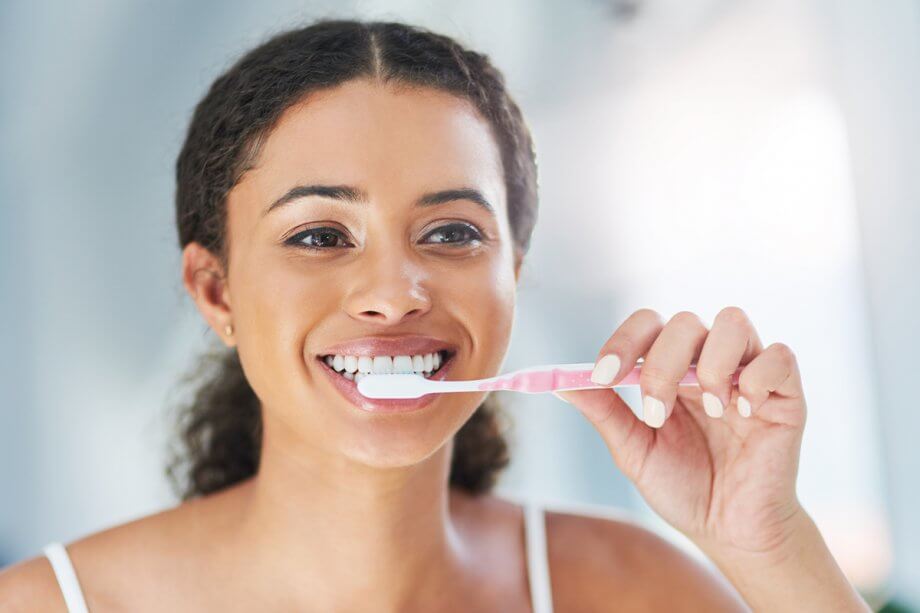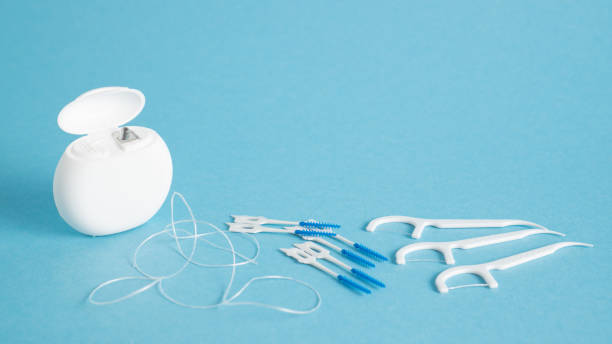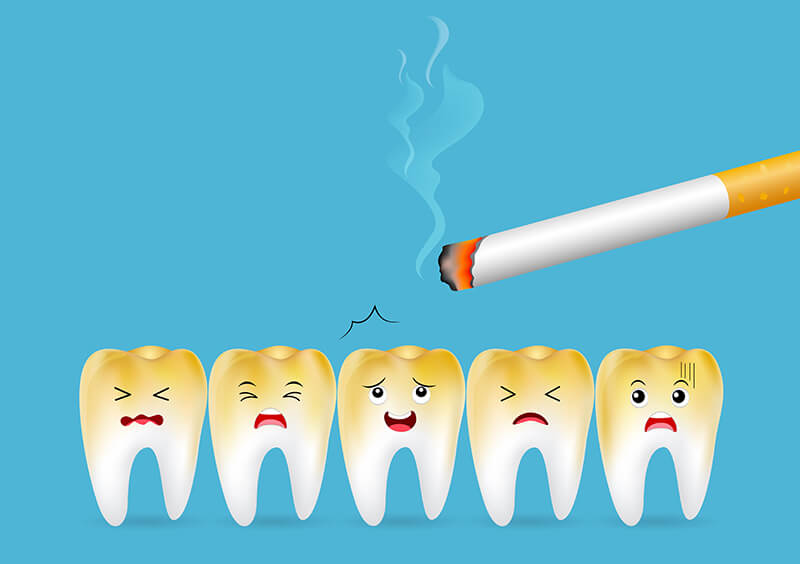Seeing the dentist every six months for a dental cleaning and checkup is the cornerstone of good oral health, but it needs to be supported with thorough at-home care. Daily brushing and flossing, choosing the right oral care products, and protecting your teeth from damage are all just as important to maintaining a bright, healthy smile. By having a good oral hygiene routine at home, you’ll prevent plaque buildup, tartar formation, and enamel erosion between dental appointments and lower your risk of cavities and other dental problems.
In the following guide, we’ll explain how to clean and protect your teeth and gums at home so you can enjoy excellent oral health (and worry-free dental exams).
7 Easy Tips for Taking Care of Your Teeth & Gums At Home
1. Practice effective daily oral hygiene.

Good oral hygiene starts with brushing your teeth twice daily and flossing at least once daily. Brush your teeth in gentle but firm circular motions for about two minutes, making sure you clean the gum line and around your back molars. (Brush at a 45-degree angle against the gum line to remove plaque from the base of the teeth.) Brush the outside surfaces of your teeth, the chewing surfaces, and the inside surfaces (facing towards your tongue). Don’t scrub your teeth forcefully, as doing so can damage the enamel.
To floss your teeth, use a floss pick or an 18 to 24-inch section of dental floss. If using dental floss, wind the ends of the floss around your fingers, then hold the middle section taught. Place the dental floss or floss pick between your teeth and gently glide it up and down, making sure not to put too much pressure on your gums. Repeat this process for each tooth.
Don’t skip flossing teeth with tight gaps between them, as small pieces of food are especially likely to get trapped in these areas. After flossing, rinse your mouth with water to remove any loosened food particles. If you can’t comfortably floss your teeth due to misalignment or other issues, talk with your dentist, as you may need orthodontic treatment. Read here to learn about why it’s important to correct misaligned teeth (or an uneven bite).
2. Choose the right oral care products.
Choosing the right oral products is the first step in ensuring the proper care of your teeth and gums at home. To brush your teeth effectively, choose a manual or electric toothbrush with soft bristles that can flex to reach crevices in the teeth and below the gums. Toothbrushes with hard bristles are less effective at removing plaque from these areas and may contribute to enamel erosion. Your toothbrush should also have a comfortable handle that’s easy to grip. Remember to also replace
For best results, brush with a toothpaste that contains fluoride. Fluoride is a natural mineral that strengthens tooth enamel by assisting in remineralization, a process that reverses superficial enamel loss to prevent the formation of cavities.
When flossing, look for a high-quality PTFE floss, as this type of floss is less likely to snap or fray during use. Or, if you find using string floss difficult or uncomfortable, consider using a floss pick with flat floss (not string floss) instead. Another option is switching to a water flosser; these tools use precise, powerful jets of water to clean between teeth, and some experts believe they’re more effective at removing plaque below the gum line than traditional floss.
3. Improve your dental care routine with Additional tools.

While regular brushing and flossing are the foundations for maintaining a healthy mouth, they aren’t the only methods for taking care of you teeth and gums at home. Using an interdental brush (a thin, soft brush that fits between the teeth) has been shown to remove more plaque than flossing alone. Interdental brushes are also less likely to cause gum bleeding, which is helpful for those struggling with gingivitis.
After brushing and flossing, most dentists recommend rinsing the mouth with mouthwash. Mouthwash rinses away dislodged food particles while killing harmful bacteria, leaving you with a brighter smile and fresher breath. Many mouthwashes contain mild tooth-whitening compounds, such as hydrogen peroxide, along with active ingredients like fluoride that combat acid erosion and tooth decay.
Tongue scrapers offer another method for improving oral health, particularly for people who experience a condition called “coated tongue.” Coated tongue, also known as white tongue, is an accumulation of dead skin cells and bacteria on the surface of the tongue, which can contribute to bad breath. Tongue scrapers are small devices designed to comfortably remove this film, which may help prevent bacteria from spreading to the gums.
4. Stay hydrated and increase saliva production.
 and (max-width: 480px) 480px, (min-width: 481px) and (max-width: 980px) 980px, (min-width: 981px) and (max-width: 1280px) 1280px, (min-width: 1281px) 2500px, 100vw” data-lazy-src=”https://drdalmao.com/wp-content/uploads/2023/10/drini-water-mc-230119-70d222.jpg” /></span></div>
<div class=)
Saliva plays a crucial role in protecting your teeth and gums by preventing cavities and gum disease. Not only does saliva help wash away food particles, bacteria, and acid, but it also deposits protective minerals on the teeth. For this reason, people who experience “dry mouth” as a result of smoking or medication are more susceptible to tooth decay.
To keep your mouth hydrated and stimulate saliva production, drink at least eight glasses of water a day. In many areas, including Toronto and Mississauga, a small amount of fluoride is added to drinking water, which increases saliva’s ability to remineralize the teeth.
If your mouth feels dry between glasses of water, chew sugar-free gum to encourage saliva production.
5. Eat a healthy, balanced diet.
 and (max-width: 480px) 480px, (min-width: 481px) and (max-width: 980px) 980px, (min-width: 981px) and (max-width: 1280px) 1280px, (min-width: 1281px) 1500px, 100vw” data-lazy-src=”https://drdalmao.com/wp-content/uploads/2023/10/article_291139_the-top-10-healthiest-foods-for-kids_-02-4b745e57928c4786a61b47d8ba920058.jpg” /></span></div>
<div class=)
It’s well-known that sugary foods like candy, soft drinks, and desserts can damage tooth enamel by provoking the overgrowth of acid-producing bacteria. However, many other foods and drinks can also damage the teeth, including acidic beverages (e.g., fruit juice and sugar-free sodas), foods containing “sticky” carbohydrates (such as potato chips and crackers), and even dried fruit, which is both sweet and acidic. You can protect your teeth by avoiding brushing for at least half an hour after consuming an acidic food or beverage to reduce enamel loss.
To prevent acid erosion, choose whole grain foods, nuts, and fresh fruits and vegetables to snack on instead of sugary or highly processed foods. The natural fibre in these foods removes plaque while stimulating saliva production through chewing. Dairy products, such as milk, unsweetened yogurt, and cheese, also benefit dental health. Dairy products neutralize acid in the mouth while depositing enamel-strengthening minerals, such as calcium and phosphates, on the teeth.
Some of the best foods for dental health include almonds, brazil nuts, cheese, celery, carrots, lean meat (or tofu), and fresh, unsweetened cranberries.
6. Protect your teeth during sports and sleep.
To prevent dental injuries, use a dentist-fitted mouthguard during sports. Mouthguards should also be worn overnight by anyone who suffers from bruxism (tooth grinding). In addition to causing tension in the head and jaw, chronic bruxism wears down the enamel on the chewing surfaces of the teeth. In severe cases, it can even lead to chipped or cracked teeth.
7. Avoid smoking and tobacco use.

Smoking (and other forms of tobacco use, such as vaping) damage the teeth and gums in multiple ways. Smoking irritates and inflames the gums, reduces saliva production, and inhibits blood flow to the mouth, increasing the risk of periodontal disease and tooth decay. Smoking is also a major risk factor for oral cancer.
If you smoke, talk to your dentist or doctor about quitting. There are many resources available to make smoking cessation easier and more comfortable, and quitting is possible no matter how long you’ve been smoking.
Conclusion
Daily brushing and flossing, along with a healthy lifestyle and dental injury prevention, is crucial to maintaining your oral health – and your overall health. People with healthy teeth and gums have a lower incidence of heart disease, diabetes, and dementia. They’re also less likely to develop lung infections. By maintaining good oral health habits at home and having routine dental checkups, you’ll improve your smile and quality of life.
At our Mississauga dental practice, we include comprehensive patient education as part of each dental exam. Dr. Oscar Dalmao can help you choose the best oral care products based on your specific dental needs and teach you – and your children – how you can further care for your teeth at home. By supporting excellent home care, we ensure our patients avoid the most common dental problems and enjoy a beautiful, functional smile for life.
If you’re due for a dental checkup, contact our team today to experience the difference compassionate, informative dental care can make in your life.


